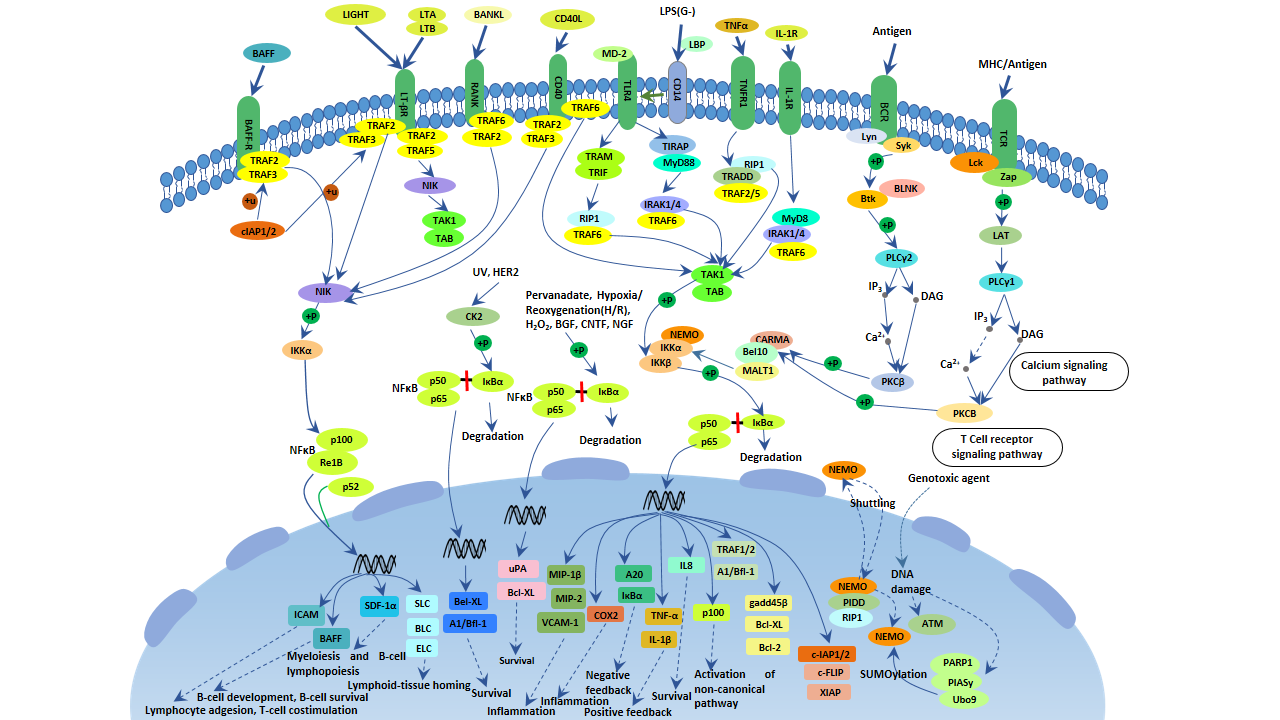
What is Nuclear Factor-Kappa B (NF-Kappa B)?
Nuclear factor-kappa B (NF-kappa B) is the generic name of a family of transcription factors that function as dimers and regulate genes involved in immunity, inflammation and cell survival.
NF-Kappa B Signaling Pathway
There are several pathways leading to NF-kappa B-activation.
Canonical NF-Kappa B Pathway
As shown in the following picture, the canonical NF-kappa B pathway is induced by tumour necrosis factor-alpha (TNF-alpha), interleukin-1 (IL-1) or byproducts of bacterial and viral infections. This pathway relies on IKK- mediated IkappaB-alpha phosphorylation on Ser32 and 36, leading to its degradation, which allows the p50/p65 NF-kappa B dimer to enter the nucleus and activate gene transcription.
Non-Canonical NF-Kappa B Pathway
Atypical pathways are IKK-independent and rely on phosphorylation of IkappaB-alpha on Tyr42 or on Ser residues in IkappaB-alpha PEST domain. The non-canonical pathway is triggered by particular members of the TNFR superfamily, such as lymphotoxin-beta (LT-beta) or BAFF. It involves NIK and IKK-alpha-mediated p100 phosphorylation and processing to p52, resulting in nuclear translocation of p52/RelB heterodimers.
The Function of NF-Kappa B Pathway
All in all, the NF-κB signaling pathway is involved in pathological processes such as infection, inflammation, immune response, apoptosis, and tumor, as well as cell cycle regulation and cell differentiation through target gene expression products. Adaptor proteins recruit the IKK complex which phosphorylates and degrades IκB, allowing NF-κB to translocate to the nucleus. Dysregulation of NF-κB signaling can lead to inflammatory and autoimmune disease and cancer.
When NF-κB is translocated into the nucleus, it binds to the NF-κB binding motif 5'-GGGRNNYYCC-3' on the target gene promoter or enhancer, and induces transcription of many factors.
These factors include cytokines (TNF-α, IFN-beta, IL-1beta, IL-2, IL-3 and IL-6, etc.), chemokines (IL-8, RANTES, MCP-1), adhesion molecules (E-selectin, ICAM-1 and VCAM-1), acute response protein, complement, growth factor (GM-CSF, G-CSF and M-CSF ) and transcription factors and so on.





